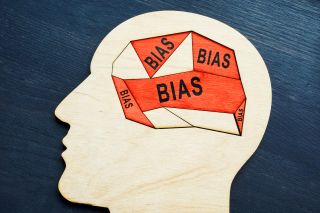Bias
Outsmarting Confirmation Bias
Health advice often falls on deaf ears. Here’s why.
Posted April 26, 2023 Reviewed by Davia Sills
Key points
- We become attached to our beliefs and tend to look only for information that reinforces them.
- This tendency doesn’t work in our favor when it comes to developing new, healthier habits.
- One way around this challenge is to set up a rewarding environment rather than relying on logic, reasoning, or advice.

We humans like to categorize things in our minds. It just makes everyday living much easier.
Back in the early days, it would have looked something like this: A large beast on four legs, with fur and fangs, was probably a carnivore and to be avoided as soon as possible. Such a conclusion could be life-saving. In this case, not taking the time to weigh other options could be a good thing.
These days, it might look more like this: If a person is very attached to eating lots of butter, they will embrace cooking with butter, generously spreading it on bread, and so on. That person will tend to dismiss any information that warns of the dangers of doing so. We have the ability to stick with a decision, habit, or point of view without making an effort to consider anything else. This is confirmation bias.
As Jonathan Haidt puts it in his book, The Righteous Mind, confirmation bias occurs when "each individual reasoner is really good at one thing: finding evidence to support the position he or she already holds, usually for intuitive reasons."
Confirmation bias is often referred to in more philosophical areas, like politics and religion—areas where there is a great deal of opinion, self-image, and alignment of values at stake. But Haidt added another dimension, which is that people will often ask themselves, consciously or unconsciously, whether they can believe something or even whether it is necessary to believe it. In other words, people check in with themselves and decide whether believing a certain thing is convenient or desirable.
Confirmation Bias in Health Choices
Let's say a person has been given the advice to eat more vegetables because those foods can help fight disease processes and may even help to maintain a healthy weight. This person already knows that they don't like the taste of vegetables, and they think vegetables are a nuisance to prepare. Besides, they tell themselves, how important is it really? Their existing beliefs and experiences are left intact.
There is another aspect to this, which may be overlooked in a discussion about confirmation bias: People do not like too many choices. In spite of what we often see in the grocery store, research tells us that people would rather be faced with five choices than 20 or 30.
This plays out when we form habits. Many people end up buying the same things at the grocery store every week, ordering the same cup of coffee at Starbucks, or having the same menu on holidays. For one thing, weighing options takes time and energy. For another, we like to stick with what works for us.
Therein lies the rub. When it comes to educating people about healthy behaviors and making them seem attractive, it can be a bumpy road.
Research tells us that people are not great at following health advice unless they have a broad underlying value of maintaining health throughout life or perhaps have had a health scare.
Another related and interesting concept is the connection between confirmation bias and health literacy. Health literacy refers to the capacity to understand basic health facts, access necessary services, and make appropriate decisions. What comes to mind is the ability to set up regular doctor's visits, be able to relay the right information, ask good questions, and follow recommendations.
Often health literacy is tied to one's level of education, but it is also tied to having more defined and entrenched health beliefs. This was illustrated in a study regarding belief in the efficacy of vaccinations for children. Those with higher health literacy were more likely to stick with their beliefs, possibly because they were more familiar with the concept and had thought about it several times.
Researchers have now used MEG or magnetoencephalography to study confirmation bias. In one study, the brain lit up when confirmatory evidence was presented, while dis-confirmatory evidence was not processed. In other words, confidence in beliefs actually shapes and supports a network in the brain that reinforces those beliefs.
What Can Turn This Around?
One way to make positive changes is through the phenomenon known as "stealth intervention." The idea is to make the process of health behavior change rewarding, easy, and desirable. Stealth interventions do not use logic, reasoning, or advice. An environment is set up to make the desired outcome fun and satisfying.
For example, one study did this by adding a dance class to after-school offerings. Students became more active and social and developed positive feelings for movement. In this case, health benefits were not the primary goal. Another example was adding a course for college students called "Food and Society: Exploring Eating Behaviors in a Social, Environmental, and Policy Context." Here, the focus was not on individual health but on broader food-related issues. College students who took that course ended up reporting improvements in vegetable consumption and a reduction of high-fat dairy (presumably ice cream or cheese). It wasn't a panacea, but it did result in significant changes in some healthy behaviors.
It's little wonder that making health behavior changes is a tough sell. People already have lots of beliefs that may be getting in the way. As we can see, confirmation bias can be a powerful deterrent to finding the motivation to make more healthy choices. The answer is not an easy one. It involves broadening the approach and developing health interventions that engage our sense of pleasure, reward, and curiosity.
References
Haidt, J. (2012). The Righteous Mind: Why Good People are Divided by Politics and Religion. Vintage Books, New York.
Dickinson, D.L. and Kakoschke, N. (2021). Seeking confirmation? Biased information search and deliberation in the food domain. Science Direct. Food Quality and Preference. Vol. 91.
Meppelink, C.S., Smit, E.G., Fransen, M.L., Diviani, N. (2019). “I was Right about Vaccination”: Confirmation Bias and Health Literacy in Online Health Information Seeking. Journal of Health Comunication. 24: 129-140,
Rollwage, M., Loosen, A., Hauser, T.U., Moran, R., Dolan, R, Fleming, S.M. (2020). Confidence drives a neural confirmation bias. Nature Communications. 11:2634.
Hekler, E.B., Gardner, C.D., Robinson, T.N. (2010). Effects of a College Course About Food and Society on Students’ Eating Behaviors. American Journal of Preventive Medicine. 38: (5), 543-547.




